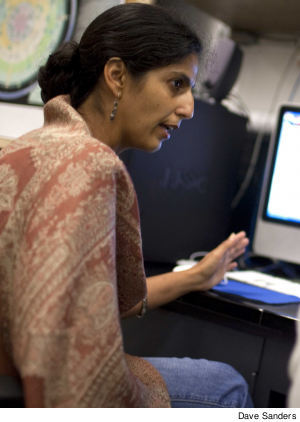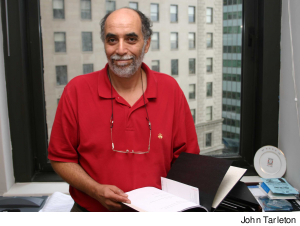Process Remains Under Faculty Control
by Peter Hogness
After prolonged negotiations, the PSC and CUNY management have reached agreement on changes to the PSC-CUNY Research Award Program, in a three-year pilot program that both sides greeted as a significant advance.
“This was a tough negotiation, but the result is an even stronger program than before,” said PSC President Barbara Bowen. “The new structure preserves the bedrock principles of faculty decision-making and broad accessibility of grants, while introducing a whole new category of awards that range up to $12,000.” CUNY will increase its contributions to the program in order to fund these new awards.
The program’s application deadline has been changed to January 15, and the selection process has been streamlined. The goal is to enable those serving on panels that decide on the awards to spend less time on administrative details, and make decisions through a more focused period of discussion.
BIGGER AWARDS
 |
| Dave Sanders |
At press time, application instructions and the new application form had not yet been finalized. They will be posted on the PSC and RF-CUNY websites later in the semester.
The agreement maintains funding levels to permit roughly the same number of grants as in recent years. There will be “Traditional A Awards” of up to $3,500 (last year’s average award amount), which as a group will receive most of the program’s funding, and “Traditional B Awards” of up to $6,000, which will receive the next largest amount of funds. There will be up to 40 of the new “Enhanced Awards” of up to $12,000 each, in each year of the pilot program; these will be supported through a combination of additional funds from CUNY and administrative savings.
According to the joint announcement of the agreement, CUNY will provide an additional $250,000 to fund this three-year expansion of the awards, while the union “will seek to identify a further $250,000 for PSC-CUNY Awards in the next round of collective bargaining.”
Bowen said that the accord balanced a number of concerns. “For many years, faculty have talked to us about the need for larger grants, and now we have been able to accomplish that – without taking a penny from the money for the existing program,” she told Clarion.
Negotiations were initiated when management advanced proposals through a Chancellor’s Task Force that called for expanding the size of awards by cutting back on smaller grants, allocating funds by campus rather than by discipline, and eliminating the UCRA, replacing it with campus-based committees that many faculty feared would be dominated by college administrators.
The Research Awards are contractual, so the union stepped in to represent members’ concerns in talks with CUNY management. In that role, the PSC worked closely with the chair of the University Faculty Senate (UFS) and members of the executive committee of the University Committee on Research Awards (UCRA) which guides and administers the current program. In the end, though the negotiations were not easy, the two sides worked their way to an accord that all parties consider a step forward.
“I congratulate the PSC and the University for reaching a groundbreaking agreement that provides a significant improvement in the program,” outgoing UFS Chair Manfred Philipp wrote in an August 24 message to UFS members. “The UFS thanks President Bowen and all of the other members of the PSC team for this success.”
“The new framework was the product of an intense but collaborative negotiation with CUNY, and I thank my negotiating partners,” Bowen told Clarion. “Support from the UFS was critical, and special credit should go to Cheryl Bluestone and Joe Wilson of the UCRA,” she added. “They love this program, and they showed tremendous tenacity and flexibility as we worked to refashion it.”
EVERYONE WINS
 |
“The agreement preserves a very important tradition of faculty-guided research,” said Wilson, a professor of political science at Brooklyn College. “Over the years the PSC-CUNY Awards have been a critical source of funding for thousands of faculty members, and they have also laid the foundation for a lot of subsequent research.”
The new guidelines “show the creativity of the PSC leadership in negotiating an agreement that will ultimately benefit the entire University,” Wilson said. “Everybody wins in this agreement.”
In addition to preserving faculty control, he noted, the traditional, smaller awards have been maintained, along with a particular focus on supporting research by untenured faculty. “But we have also expanded the financial pie to provide the opportunity for larger awards,” said Wilson, “for people in all disciplines who may have research agendas that are more expensive to pursue.”
The UCRA’s Cheryl Bluestone, professor of psychology at Queensborough Community College, told Clarion that the changes “preserve the best aspects of the program while streamlining and expanding it.”
“All the parties involved did attempt to be as flexible as possible,” Bluestone said. “The union did a great job of negotiating while maintaining the principles we saw as central to the program’s effectiveness.”
This is a pilot program, and experience with these changes may indicate that some adjustments are needed, Bluestone added. “Anything you try that’s new may have to be tweaked,” she said. “Hopefully we’ll have a cooperative process throughout this pilot, with all parties evaluating the need for any small changes that might be helpful along the way. And at the end of the three years, it will be crucial for the union, faculty governance bodies, and CUNY administration to cooperate in evaluating the overall effectiveness of the pilot program.”
The new procedures eliminate a number of administrative hurdles from the application review process. There will be only one deadline per year (January 15) and only one round of grants awarded. Few outside reviewers will be needed. The process of grant review for Traditional A and B Awards will focus on the academic judgment of panel members, made up of CUNY faculty who will meet to consider applications over a period of a few days. Enhanced Award applications will be reviewed in writing by two experts selected by the panel chairs, from within or outside CUNY. As in the past, deliberations will be confidential.
“Finding ways to streamline the application review process, as long as principles like faculty control are maintained, is a good thing,” said Wilson.
A STRONG COMMITMENT
There will now be 18 discipline-based panels instead of the previous 31. As before, these panels will decide on applications for the Traditional A and B Awards. Decisions on the new Enhanced Awards will be made by the UCRA, now made up of the chairs of the 18 panels. As in the past, panel chairs will be selected by the Chancellor, from names unanimously recommended by the UFS; they will be asked to serve for the three years of the pilot program.
“At this point, success depends on faculty being willing to serve as panel members,” said Bluestone. She noted that similar processes have worked well at other universities. “I’m hopeful that the panel chairs will have success finding panel members to participate in the review process,” she told Clarion. “At CUNY, a lot of faculty feel a strong commitment to this program. They’re very aware of how it helped them to get started, and the difference it has made for many others.” Faculty willing to work a few hours a year, she said, can make this program successful.
A PDF of the joint PSC-CUNY announcement is available here. A new application form and new instructions are not yet finalized; they will be posted later in the semester.
| Attachment | Size |
|---|---|
| 38.88 KB |

